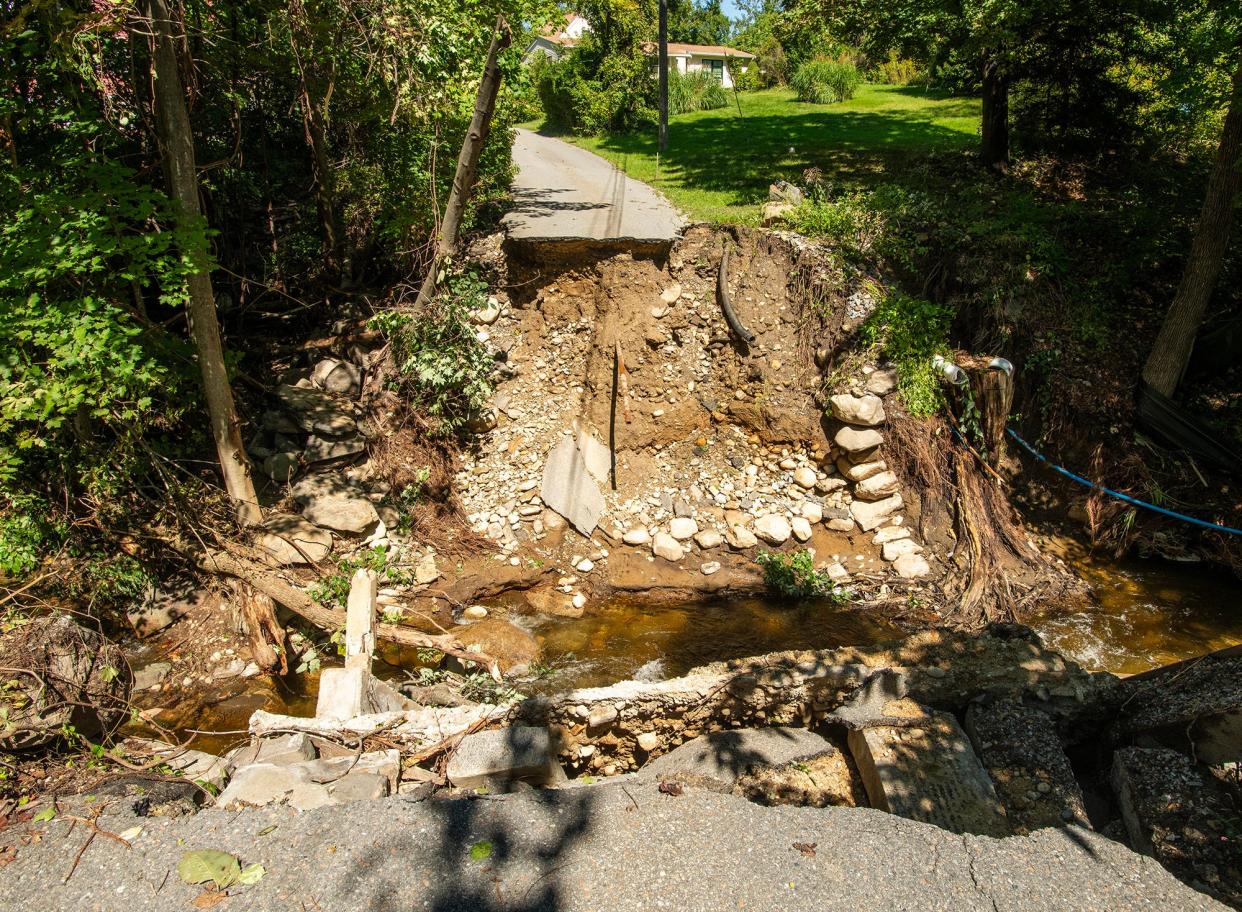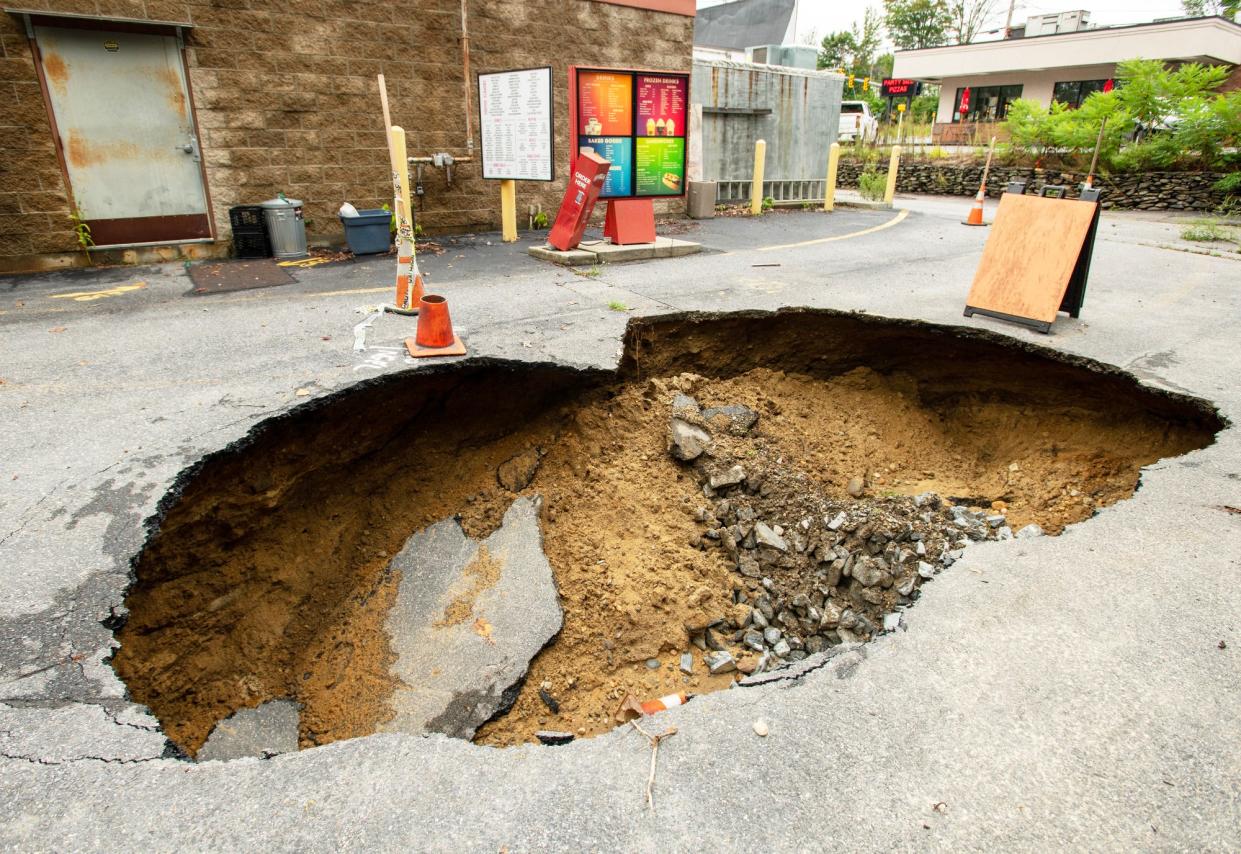Leominster, other communities denied FEMA disaster aid for September rains, flash floods
The federal government opted to keep its hands deep in its pockets and denied a requested disaster declaration for Bristol, Hampden and Worcester counties devastated by torrential rains and flash floods last September.

The reaction among local legislators was incredulity and bitterness.
Leominster Mayor Dean Mazzarella posted the denial letter in which Federal Emergency Management Agency found that the "event was not of such a severity and magnitude as to be beyond the capabilities of the state, affected local governments and voluntary agencies." Management at FEMA had "determined that supplemental federal assistance is not necessary. The request for a major disaster declaration is denied."
"It was a shock to all of us," Mazzarella said yesterday after posting the letter on the city's Facebook account Tuesday night, when it was released by the Healey/Driscoll administration. In discussing next steps with the governor, Mazzarella said, Gov. Maura Healey assured him that the state was working on appealing the decision.
"We thought it was a no-brainer," Mazzarella said. The city submitted detailed plans for $35 million in needed repairs to municipal infrastructure. Locally, 1,400 families also submitted the reams of paperwork requested by FEMA as they applied for individual assistance to make needed repairs to their homes.
In discussing the denial, Mazzarella said that the reaction among the residents he updated was disbelief. "It was a 'wait a minute' moment," Mazzarella said. Many pointed out that the state is spending billons on housing migrants, a situation created by the federal government's inaction on immigration reform. They also pointed out that the U.S. Senate had voted to send $100 billion in foreign and military aid to other countries.
"We never make requests like this," Mazzarella said.

Even as Healey and her staff work with local officials to appeal the finding, Healey has also authorized the distribution of $5 million set aside for disaster relief in her supplemental budget last fall.
“Our administration is deeply disappointed that FEMA denied our request for a major disaster declaration for damage caused by extreme weather in September," said Karissa Hand, a spokesperson for the governor. "We submitted a strong request based on the severe local impacts this storm had on our communities. We plan to appeal this decision and will do everything we can to continue our advocacy with our federal partners and support our communities.”
FEMA response 'out of touch'
State legislators who responded to requests for comment quoted the same sentence over and over from the FEMA letter — the one that found the magnitude of damage did not exceed the state's ability to fund the needed repairs.
"The response provided by FEMA...is out of touch, and to be honest, insulting to our emergency response personnel," said Rep. David LeBoeuf, D-Worcester.
Sen. Michael Moore, D-Millbury, called it "ridiculous" that the federal government is not "willing to provide us with assistance," while sending billions to Israel, Taiwan, Ukraine and for border relief. "It shows the disconnect between Washington and the people they are supposed to be representing.
"The federal government has left the taxpayers of Massachusetts handling the cost of a natural disaster and are asking us to pick up the cost of the federal inaction with the migrant crisis," Moore said. Massachusetts has allocated $2 billion through the end of fiscal year 2025 to subsidize the state's emergency shelter system. Almost half the 7,500 families housed in emergency shelters throughout the state are new to the commonwealth.
He speculated that Massachusetts may be more able to fund disaster relief if it were not paying that $2 billion for migrant-related expenses.
The September storms hit close to home for Rep. Natalie Higgins, D-Leominster, literally, washing away a slice of a close-by hillside into Elm Street, blocking the city's thoroughfare and leaving a big gouge in the hill, exposing tree roots. She is afraid of further collapse and is at a loss as how it could be repaired, especially now that the federal government has denied the community's request for federal relief.
"We did not see this one coming," Higgins said. The images depicting the flash floods that washed away sections of roadway, train tracks and people's homes and gardens made the national news. "It was a 900-year storm."
"The letter was particularly hard to read," she said, and also quoted the offending sentence that found the damage was not so extensive that it could not be handled by the state, municipalities and local voluntary organizations. The indication from local federal officials working with municipal and state agencies was that the municipality had to sustain at least $12 million in damage to be eligible for federal relief.
"Everybody on the ground seemed to be sure that Leominster had cleared the threshold," Higgins said, and asked, "How much more damage is needed in order for us to get help? What else do they need; more personal stories, more pictures, more images of ongoing damage?"
Creation of state-based disaster fund
Sen. Jo Comerford, D-Northampton, has been working to establish a state-based disaster relief fund for Massachusetts, a project that has been embraced and elevated by the governor, who included $250 million for the project in her fiscal 2025 budget.
"I'm extraordinarily disappointed in FEMA's response, which leaves Massachusetts alone to shoulder the burden of natural disasters across the commonwealth," Comerford said. "I'm grateful to the governor and her administration for understanding the need for a systemic state response going forward."
Both Reps. James O'Day, D-West Boylston, and Jon Zlotnik, D-Gardner, expressed their disappointment in the Biden administration's denial of federal help.
While his district was not directly affected by the torrential downpours and flash floods, Zlotnik said he was "taken aback," by the denial. "Anyone who saw the reports and images coming out of Leominster, especially, I expect will be similarly surprised by this development," he said. "It speaks to the need for better and a more predictable (disaster declaration) process."
Zlotnik decried the lack of clarity about what help communities can expect from the federal government.
Fattman: Rejection no surprise
As one of four Republican senators in the State House, Ryan Fattman, R-Sutton, noted that while disappointing the denial of relief is not surprising.
"Massachusetts' faith in the federal government to ride in on a white horse and save the day is both naive and fiscally irresponsible to our residents," Fattman said. "We had it within our budget to help support those impacted by the late summer flooding. But when the opportunity came for the government of Massachusetts to hep in the form of a supplemental budget, Beacon Hill decided the overwhelming priority was migrants, not long-term residents whose homes, farms and lives were destroyed."
Fattman suggested his colleagues on Beacon Hill "wake up to the reality that every day, Massachusetts taxpayers are sending $3,000,000 to support nonresidents."
Higgins, who recently attended a climate change conference, said she learned that New England will be one of the areas most affected by climate change in the coming years. "We're getting wetter, and we learned this year how much damage water can do."
As Higgins grapples with the news of the denial and the pain of informing families that the federal government has denied them the needed funds to address the damage, she could not believe that it took FEMA a long time to come to a decision.
"That was the salt in the wound, they made us wait so long for this news," Higgins said. That wait time seemed to indicate that the claims would be accepted and the funds would be approved and forthcoming.
One family of four have been shut out of their home for five months. Luckily, Higgins said, they had friends they could turn to for help. At first, they thought it would be a matter of a couple of weeks before they could return home, then maybe a month. Five months is not sustainable.
The family lived in a condominium complex close to Coburn Street; the waterway behind the buildings has shifted and floods the structures regularly.
Higgins has found a silver lining — the community's cohesion and support in the face of the disaster.
"It showed our incredible resiliency," Higgins said.
This article originally appeared on Telegram & Gazette: Federal disaster relief a no-go for Bristol, Hampden, Worcester
